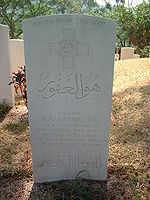
Mateen Ahmed Ansari
Encyclopedia

George Cross
The George Cross is the highest civil decoration of the United Kingdom, and also holds, or has held, that status in many of the other countries of the Commonwealth of Nations...
(c.
Circa
Circa , usually abbreviated c. or ca. , means "approximately" in the English language, usually referring to a date...
1915 – 29 October 1943) of the 5th Battalion, 7th Rajput Regiment
7th Rajput Regiment
The 7th Rajput Regiment was an infantry regiment of the British Indian Army. It was formed in 1922, after the Indian government decided to reform the army moving away from single battalion regiments to multi battalion regiments...
, in the Indian Army during World War II, and member of the British Army Aid Group
British Army Aid Group
The British Army Aid Group was a para-military organisation for British and allied forces in Southern China during the Second World War. The BAAG was officially classified in the British Army's order of battle as a MI9 unit that was responsible for assisting prisoners of war to escape from the...
was awarded the George Cross
George Cross
The George Cross is the highest civil decoration of the United Kingdom, and also holds, or has held, that status in many of the other countries of the Commonwealth of Nations...
posthumously. The decoration, the highest British
United Kingdom
The United Kingdom of Great Britain and Northern IrelandIn the United Kingdom and Dependencies, other languages have been officially recognised as legitimate autochthonous languages under the European Charter for Regional or Minority Languages...
(and Commonwealth
Commonwealth of Nations
The Commonwealth of Nations, normally referred to as the Commonwealth and formerly known as the British Commonwealth, is an intergovernmental organisation of fifty-four independent member states...
) award for bravery out of combat, was announced in a supplement to the London Gazette
London Gazette
The London Gazette is one of the official journals of record of the British government, and the most important among such official journals in the United Kingdom, in which certain statutory notices are required to be published...
of 16 April 1946 as being awarded for the 'most conspicuous gallantry.'
He was taken prisoner by the Japanese after they invaded Hong Kong
Hong Kong
Hong Kong is one of two Special Administrative Regions of the People's Republic of China , the other being Macau. A city-state situated on China's south coast and enclosed by the Pearl River Delta and South China Sea, it is renowned for its expansive skyline and deep natural harbour...
in December 1941. After the Japanese discovered that he was related to the ruler of one of the Princely States they demanded that he renounce his allegiance to the British and foment discontent in the ranks of Indian prisoners in the prison camps. He refused and was thrown into the notorious Stanley Jail in May 1942 where he was starved and brutalised. When he remained firm in his allegiance to the British on his return to the prison camps he was again incarcerated in Stanley Jail where he was starved and tortured for five months. He was then returned to the original camp, where he continued in his allegiance to the British, and even helped to organise escape attempts by other prisoners. He was sentenced to death, with over thirty other British, Chinese and Indian prisoners and beheaded on 20 October 1943. He is buried in Stanley Military Cemetery
Stanley Military Cemetery
Stanley Military Cemetery is located near St. Stephen Bay in Stanley, Hong Kong. It is the only military cemetery of the early colonial era, used for the burials of the members of the garrison and their families between 1841 and 1866...
in Hong Kong.

